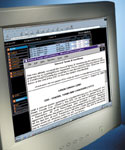
Enron North America
Enron's footprint is everywhere in the North American wholesale energy business. We conduct hundreds of daily transactions, touching every part of the energy market. Generators, distributors, marketers and producers rely on us to make markets, transport, provide logistics and deliver the commodity. Wholesale competition thrives on services we provide, including risk management and capital.
| EnronOnline | |||
| No one trades energy over the Internet. | |||
| ENRON ASKS WHY? | |||
| click here |
|||
Natural Gas
Although natural gas is our most mature business, we anticipate continued growth in volume and market share in 2000. The demand for gas itself is on the upswing, the result of a surge in new gas-fired electricity generation. Gas consumption by generators will increase to 8.8 trillion cubic feet (Tcf) in 2010 from 5 Tcf today. EnronOnline will be a magnet for much of this new business.
In 1999 we retained our position as the No. 1 gas merchant in the United States and Canada, with physical volume of approximately 13.3 billion cubic feet equivalent (Bcfe) per day.
Electricity
| ENRON NORTH AMERICA | |||
| During the summer there are still brownouts in the U.S. | |||
| ENRON ASKS WHY? | |||
| click here |
|||
In 1999 we built three single-cycle gas-fired power plants to produce 1,340 megawatts of peaking power. This power supports our market positions when power is scarce. The power provides greater flexibility to our merchant operations and increases reliability in previously underserved markets. In 2000 we will add three more plants with total capacity of approximately 1,600 megawatts. These six peaking units, located in Tennessee, Mississippi, Indiana and Illinois, serve the nation's most active and volatile electricity and natural gas markets.
Other Markets
Enron offers innovative products and services in different markets to meet the needs of high-volume energy producers and consumers.
We have developed a liquid market in coal, where we optimize commodity positions for producers and consumers. We have become the largest coal market-maker in the United States with more than 24 million tons delivered in 1999. We provide risk management tools to stabilize earnings and make capital available to producers as well.

| |
Other key markets include emission credits, crude petroleum products and weather derivatives. In addition, Enron has the financial strength to provide equity and debt investments in energy-related businesses, which can serve as our entrée to providing additional products.
Enron Europe
Enron has seized the first-mover advantage in Europe. With no comparable competition in sight as the Continental European market opens to energy competition, Enron's pan-European network of assets, contracts and market-making ability is in place and ready for exponential growth.
A presence since 1989, Enron has 18 offices in 16 countries, staffed by 1,750 employees representing 42 nationalities. With all of Enron's intellectual capital and abilities, Enron Europe is thoroughly European and thoroughly Enron.
In just a few years, the competitive European wholesale power market will rival the size of the power sector in the United States. Enron expects to assume the leading position in Europe as it has done in North America.
We are the largest merchant of natural gas and power in the U.K., which liberalized its markets in 1992. Our gas volumes increased 21 percent in 1999 to reach 1,500 billion British thermal units equivalent (BBbtue) a day, while power volumes more than tripled to 53 million megawatt-hours. In the Nordic region, the world's most deregulated electricity market, we are the largest power merchant. Our volume grew 48 percent from 1998 to reach 31 million megawatt-hours in 1999--10 times our marketing volumes in 1996.

| |
The European Union mandated liberalization of the power market in member states by February 2000. Competition is having a dramatic effect on Continental prices: for instance, in Germany wholesale prices have dropped 35 percent in less than a year. In that environment, we are a natural partner for utilities that need greater wholesale expertise to manage power supply and risk. As competition takes hold on the Continent, we are completing more transactions than any other company.
With Enron's broad array of products, we can find a way to sell energy services in almost any market. Our first transaction in Spain involved oil, our initial contract in Poland was for coal, France was receptive to a weather derivative transaction and natural gas has always been our strength in the U.K.
As Europe's appetite for wholesale transactions is whetted, Enron's business grows accordingly. Our numbers nearly tripled from 1998 to 1999. In 1999, we completed 24,240 transactions; marketing power volumes of 91 million megawatt-hours for the year and an average of 1,554 BBtue of gas per day.
Some European markets need additional assets to increase market liquidity, and we will build those assets where they make economic sense and add strategic value. Last year we completed construction of the 116-megawatt Nowa Sarzyna power plant in Poland and the 478-megawatt Marmara plant in Turkey. The 551-megawatt Sarlux combined-cycle oil gasification plant within the Saras oil refinery in Southern Sardinia, Italy, will be completed in 2000. We are developing the 240-megawatt Jertovec plant in Croatia as well as a 1,200-megawatt plant in Arcos, Spain.
Our goal is to build liquidity across Europe and serve as a strong catalyst for liberalization. As our European network expands, we will be able to lower costs, increase flexibility and expand our base of services to the marketplace, securing Enron's first-place position for the long-term.
| DABHOL: THE FOUNDATION OF ENRON'S INDIA NETWORK | |||
| click here |
|||
Since coming to India in 1992, Enron has become synonymous with commitment, responsibility, excellence and action. This image has allowed us to rapidly develop network assets, enter markets and ultimately will enable us to participate in every stage of the natural gas and electricity energy value chain as well as in the communications business.
India is a technologically advanced society, populated by sophisticated computer users, and is a large consumer of entertainment such as movies and television. Enron Broadband Services is in India to develop a fiber optic network, high-bandwidth applications and data centers. Our familiarity with the country and its regulations, our dynamic India network and our reputation will hasten the development of this market.
In Asia we are concentrating on two mature economies that are restructuring their energy markets: Japan, the fourth-largest energy market in the world, and South Korea, the 13th. The Japanese power market is scheduled to open in March and is a natural market for specialty products such as coal and crude oil intermediation and financial risk management instruments. Enron will assemble a network of assets, alliances and market activities to offer as broad a range of products as possible.
We have staked out an excellent position in South Korea, which soon will open its electricity and gas markets. In 1999 we formed SK-Enron, a joint venture with SK Corporation, one of South Korea's largest conglomerates, to manage SK's natural gas and liquefied petroleum businesses. Additionally, we acquired interests in three gas utilities and a cogeneration power plant, positioning ourselves for significant growth.
Our Australian office, launched in late 1998, is capitalizing on that country's open power market. EnronOnline will begin to transact Australian power in March. The market for gas is deregulating concurrently, and our merchant efforts will grow with the market.
In South America, Enron has built an integrated asset base of natural gas pipelines, local gas distributors, power plants and electricity distribution in the Southern Cone countries of Brazil, Argentina and Bolivia. Now that the network is complete, we are initiating wholesale merchant transactions from offices in Buenos Aires and Rio de Janeiro.
In 1999, 30 million cubic meters, or 1.06 billion cubic feet of gas, per day began to flow through the Bolivia-to-Brazil pipeline, developed in partnership with others. The first 480-megawatt phase of our Cuiabá generating station in Brazil began to produce 150 megawatts of electricity on an emergency basis; the second phase is set to start up by mid-2000.

| |
In the Caribbean in 2000, we will begin operating EcoEléctrica, a combination 500-megawatt power plant and LNG receiving facility in Puerto Rico. EcoEléctrica creates the commonwealth's first natural gas supply and will help develop Enron's global LNG business.
Enron is pursuing development opportunities in Africa. As with all asset development, we will proceed with infrastructure projects that will serve strategic interests over time.